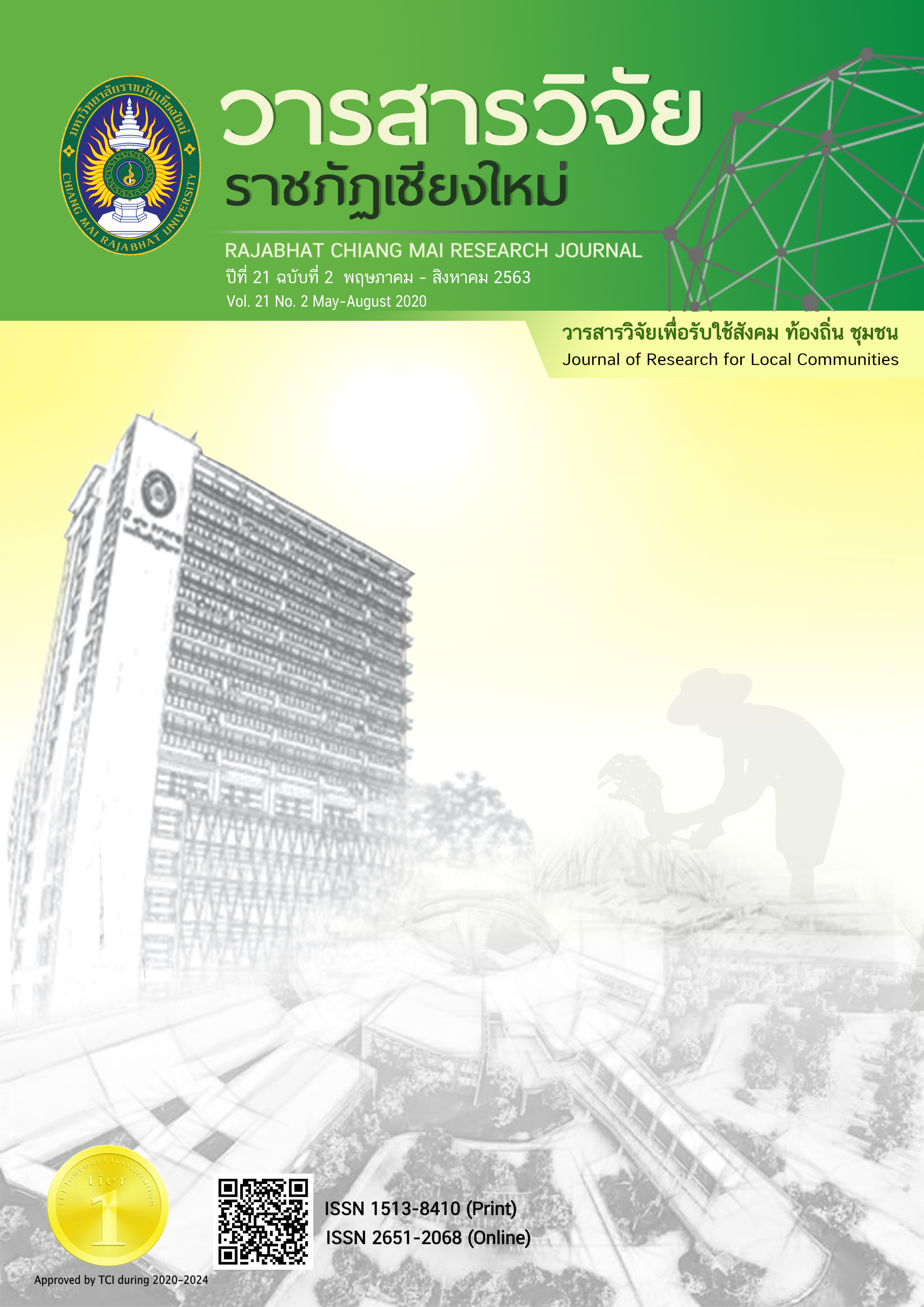Development of Health management model for Socially joined older people Through District Health System of Region Health 7
DOI:
https://doi.org/10.14456/rcmrj.2020.238652Keywords:
Health management, Socially joined older peopleAbstract
This research was conducted to study health management for the socially joined older people at district level by the Regional Health 7 in order to develop and evaluate the health management for the socially joined older people at district level by the Regional Health 7. The research was divided into 3 phases. In first phase, A sample of 394 subjects. Data were collected by using health literacy questionnaire of the socially joined older people. he quantitative statistics were used to analyze data for frequency, percentage, and standard deviation. In addition, in-depth interview were implemented 40 people and collected data for guideline to organize a participatory action meeting using an AIC technique to create health management model for the socially joined older people. The second phase, the model was implemented to promote health literacy of the socially joined older people. There were 70 subjects. The third phase, health management model for the socially joined older people at district level was evaluated in term of its effectiveness. Also, health literacy of the socially joined older people was measured, and the results of both before and after using health management model were statistically compared using paired t-test. The findings revealed that 1) the socially joined older people totally showed high level of health literacy; except the aspect of media literacy showing moderate level. In term of self-health care behavior, it was also at moderate level. Moreover, environment management was not appropriated for socially joined older people’s health. 2) As a result, a subcommittee for managing the socially joined older people needed to be appointed to improve quality of life among the socially joined older people at district level. In addition, activities to promote health literacy should be provided for them. According to evaluation of an activity package, each activity showed its effectiveness of over 75%. And 3) After implementing the model, the sample had high level of health literacy in all aspects including self-healthcare behavior. It was higher significantly at a level of .05. resulting in the socially joined older people becoming addicted to society with a higher level of health knowledge and higher self-care behaviors. As a result, socially joined older people in the area have good quality of life, reducing burden on families, communities and society.
Downloads
References
Arahung, R. (2017). The Effects of Health Literacy Enhancement Program in Hypotensive Prevention of Behavior of Pre- Hypertension Risk Group at a Community in Nakhon Pathom Province. (Master of Nursing Science, Christian University). (In Thai)
Daniel, W.W. (2010). Biostatics : Basic Concepts and Methodology for the Health.: John Wiley & Sons (Asia) Pte Ltd .
Health system research institute. (2014). District Health System (DHS). Bangkok: Ministry of Public Health. (In Thai)
Health system research institute. (2015). Annual Report 2015. Nonthaburi: Health System Research Institute. (In Thai)
Hunnirun, P. (2013). Behavioral Science in Health Education. Bangkok: Srinakharinwirot University. (In Thai)
Kaeodumkoeng, K., & Thammakul, D. (2015). Promoting Health Literacy in the Elderly Population. Journal of Health Science Research, 9(2), 1-8. (In Thai)
Khon Kaen Provincial Health Office. (2018). Basic Information Year 2018. Khon Kaen Provincial Health Office. (In Thai)
Office of the national economic and social development council. (2017). The Twelfth National Economics and Social Development Plan (2017-2021). Bangkok: Office of Prime Ministry. (In Thai)
Nonthasut, A. (2014). Social Innovation in Health System Management. Academic Conference Documents.
Maha Sarakham Provincial Public Health Office. (2018). Basic Information Year 2018. Maha Sarakham Provincial: Public Health Office.
Photisiri, W. (2017). Demographic Changes and Important Statistical Data about the Elderly In Foundation of Thai Gerontology Research and Development Institute and College of Population Studies, Chulalongkorn University. Thai Elderly Situation Report 2017. Bangkok: Pongpanich. (In Thai)
Siriphanich, B. (2017). Situation of the Thai Elderly 2016. Nakhon Pathom: Printery Co., Ltd. (In Thai)
Srikuankaew, A., Jiawiwatkul, A., &Thayansin, S. (2014). The Relationship between Happiness, Health Literacy and Quality of Life of Elderly: A Case Study in Wiang Elderly School, Fang District, Chiang Mai Province. MFU Connexion: Journal of Humanities and Soccial Sciences, 7(2), 76-95.
Srisa-ard, B. (2010). Research for Teachers. (3th ed.). Bangkok: Suwiriya Sarasan. (In Thai)
Sriprom, C. (2013). Model of Health Promotion for the Elderly. (Doctoral dissertation in Regional Development Strategies. Graduate School Ubon Rachatani Rajabhat University). (In Thai)
Suwan, P. (2019). Health Literacy: One of the Thai Goal to Reform Public Health and Environment. Retrieved from https://www.western.ac.th/media/attachments/2018/08/18/11-1.pdf (In Thai)
Taechavijitjara, C. (2018). Health Literacy: A key Indicator towards Good Health Behavior and Health Outcomes. Journal of the Thai Amy Nurses, 19(special), 1-11. (In Thai)
Downloads
Published
How to Cite
Issue
Section
License
1. Articles, information, content, images, etc published in the “Community and Social Development Journal” are copyrighted by the Community and Social Development Journal, Chiang Mai Rajabhat University. In order to properly distribute the articles through print and electronic media, the authors still hold the copyright for the published articles under the Creative Commons Attribution (CC BY) license, which allows the re-distribution of the articles in other sources. References must be made to the articles in the journal. The authors are responsible for requesting permission to reproduce copyrighted content from other sources.
2. The content of the articles appearing in the journal is the direct responsibility of the article authors. The editorial board of the journal does not necessarily agree with or share any responsibility.














